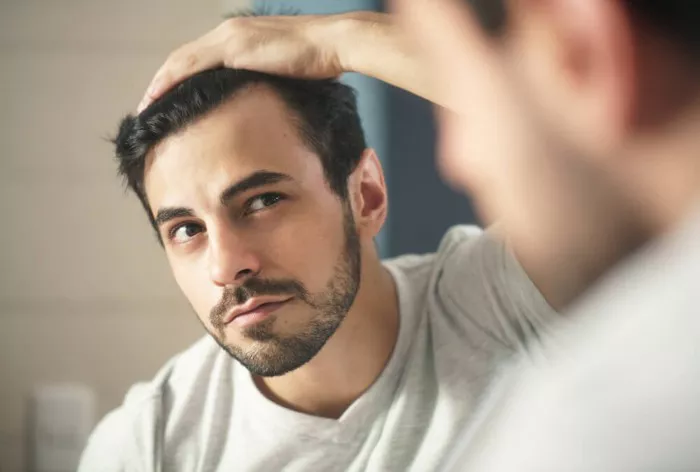Caffeine is a widely consumed stimulant found in coffee, tea, energy drinks, and various dietary supplements. While moderate caffeine consumption is generally considered safe and even associated with certain health benefits, concerns have been raised about the potential effects of excess caffeine intake on various aspects of health, including hair loss. In this comprehensive guide, we’ll delve into the science behind caffeine and its potential impact on hair health, exploring whether excess caffeine consumption could contribute to hair loss.
Understanding Hair Loss:
Types and Causes: Hair loss can occur in various forms, including androgenetic alopecia (male or female pattern baldness), telogen effluvium (temporary shedding), and alopecia areata (autoimmune-related hair loss). Understanding the underlying cause of hair loss is crucial for determining the most appropriate treatment approach.
Contributing Factors: Factors such as genetics, hormonal imbalances, nutritional deficiencies, stress, and certain medical conditions or medications can contribute to hair loss. Identifying and addressing these underlying factors is essential for managing hair loss effectively.
The Role of Caffeine in Hair Health:
Stimulation of Hair Follicles: Caffeine has been shown to stimulate hair follicles’ activity and promote hair growth by blocking the effects of dihydrotestosterone (DHT), a hormone associated with hair follicle miniaturization and hair loss in genetically susceptible individuals.
Increased Blood Circulation: Caffeine has vasodilatory properties, meaning it can widen blood vessels and increase blood flow to the scalp. Improved blood circulation to the hair follicles can enhance nutrient delivery and oxygenation, supporting healthy hair growth.
Potential Effects of Excess Caffeine on Hair Health:
Hormonal Imbalance: Excessive caffeine consumption may disrupt hormonal balance in the body, including the production and metabolism of hormones such as cortisol and DHT. Imbalances in these hormones can contribute to hair follicle miniaturization and hair loss.
Dehydration: Caffeine is a diuretic, meaning it can increase urine production and potentially lead to dehydration if consumed in excess. Dehydration can affect the health of the scalp and hair follicles, potentially contributing to hair loss over time.
Interference with Nutrient Absorption: High caffeine intake may interfere with the absorption of certain nutrients essential for hair health, such as iron and zinc. Nutritional deficiencies can impair hair follicle function and contribute to hair thinning and loss.
Increased Stress Response: Excessive caffeine consumption can trigger or exacerbate stress and anxiety symptoms in some individuals. Chronic stress is a known contributor to hair loss, and prolonged activation of the body’s stress response system can lead to hair follicle miniaturization and shedding.
Evidence and Studies:
Limited Clinical Evidence: While some studies have investigated the potential benefits of caffeine-containing hair care products for promoting hair growth, evidence regarding the effects of excess caffeine consumption on hair loss is limited and inconclusive.
Anecdotal Reports: There are anecdotal reports of individuals experiencing hair loss or thinning associated with excessive caffeine consumption. However, these reports are subjective and may be influenced by other factors such as genetics, underlying health conditions, and lifestyle habits.
Considerations and Precautions:
Moderation is Key: Moderation is crucial when it comes to caffeine consumption. Limiting intake to moderate levels (typically up to 400 milligrams per day for most adults) can help minimize the potential risks associated with excessive caffeine consumption while still allowing for the potential benefits.
Hydration: Ensure adequate hydration by drinking plenty of water throughout the day, especially if consuming caffeinated beverages. Staying hydrated is essential for maintaining scalp and hair health.
Nutritional Balance: Maintain a balanced diet rich in essential nutrients for hair health, including protein, iron, zinc, vitamins, and antioxidants. Consuming a variety of nutrient-dense foods can help support optimal hair growth and minimize the risk of nutritional deficiencies.
Individual Variation: Recognize that individual responses to caffeine consumption may vary. Some individuals may be more sensitive to caffeine’s effects on hair health, while others may tolerate higher intake levels without experiencing adverse effects.
Conclusion:
While moderate caffeine consumption is generally considered safe and may even have potential benefits for hair health, excess caffeine intake could potentially contribute to hair loss through various mechanisms such as hormonal imbalances, dehydration, nutrient interference, and increased stress response. However, the evidence regarding the direct link between excess caffeine consumption and hair loss is limited and inconclusive. It’s essential to approach caffeine consumption with moderation and balance, paying attention to individual tolerance and overall health status. By maintaining a healthy lifestyle, including a balanced diet, adequate hydration, and stress management practices, individuals can support optimal hair health and minimize the risk of hair loss.
In conclusion, while excess caffeine consumption may pose potential risks for hair health, more research is needed to fully understand its effects and determine the threshold for safe consumption.
How Long Does Menopause Hair Loss Last

